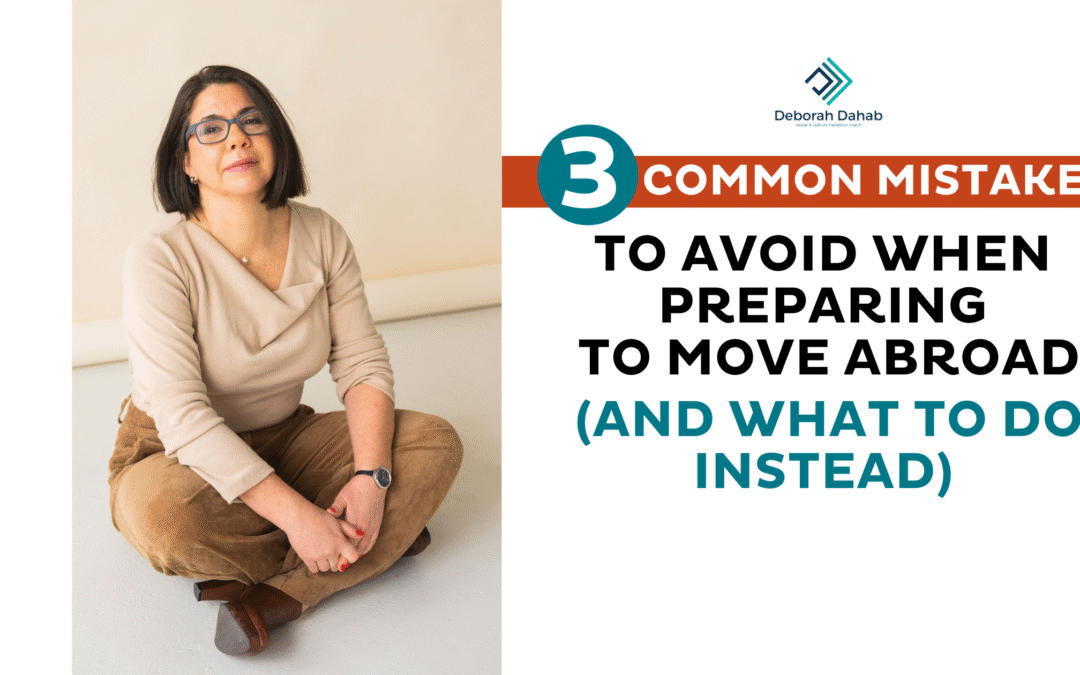
How to Decide Where to Live Abroad (When Everything Looks Good)
When every destination looks amazing, clarity comes from structure — not guesswork.
Use the Criteria-Funnel Method to move from wishful thinking to smart filtering:
1️⃣ Start with your Likes & Dislikes,
2️⃣ Build a broad Wish List,
3️⃣ Distill it into Must-Haves, and
4️⃣ End with strict Non-Negotiables.
Compare your top 3–5 locations against that funnel, and the best-fit country will practically reveal itself.
Intro
If you’ve ever Googled “best countries to move abroad”, you’ve probably ended up with ten tabs open, fifty possibilities, and a mild case of decision paralysis.
The truth? The hardest part about moving abroad isn’t paperwork or packing boxes — it’s figuring out where to go when everything looks appealing.
After more than a decade helping people plan and thrive abroad, I developed the Criteria-Funnel Method to bring order to that chaos. It helps you transform scattered ideas into a clear shortlist, based on what actually matters to you.
By the end of this guide, you’ll have a personal decision framework you can reuse any time you’re tempted by a new “maybe-someday” destination.
What Is the Criteria-Funnel Method?
The Criteria-Funnel is a four-layer process that turns intuition into structured clarity.
It works like a funnel: you start wide and open-ended, then progressively filter until only the strongest matches remain.
It’s designed to:
- Eliminate overwhelm and “analysis paralysis”
- Reveal hidden priorities and deal-breakers
- Make research more focused and meaningful
Ensure your final choice fits your lifestyle and personality, not someone else’s dream
Step 1 — Likes & Dislikes: Start Where You Are
Before you dream ahead, look behind.
Write down everything you like and dislike about your current lifestyle — climate, culture, pace, food, work rhythm, social life, housing, transport.
💡 Tip: Have every household member fill their own list separately. You’ll be surprised by how many assumptions you share… or don’t.
Mini exercise:
|
What I Like |
What I Dislike |
|
Walkable neighborhoods |
Heavy traffic |
|
Outdoor cafés |
Extreme cold |
|
Reliable Wi-Fi |
Long commutes |
These patterns become the foundation of your future criteria.
Step 2 — Wish List: Dream Without Limits
Now it’s time to open the funnel wide.
List everything you’d love in your new life abroad — even the things that feel unrealistic. Think of this as your “Pinterest board in words.”
Examples:
- Sea-view apartment
- Year-round sunshine
- Affordable healthcare
- Strong expat community
- Safe for kids
- Easy airport access
Don’t edit yet. This stage is about possibility, not practicality. You can’t prioritize what you haven’t imagined.
Step 3 — Must-Haves: Focus on What Defines Quality of Life
Now we start narrowing.
Go through your Wish List and highlight the 5–7 things that are essential for your happiness and well-being.
Ask yourself:
“If this element is missing, would I still feel at home?”
For instance:
- Mild climate
- Reliable public transport
- Access to fresh food markets
- Safety and community feel
These Must-Haves become your core decision filter — they separate “nice-to-have” from “need-to-have.”
Sample Scorecard:
|
Criterion |
Weight (1–3) |
Portugal |
Mexico |
Spain |
|
Safety |
3 |
✅ |
⚠️ |
✅ |
|
Cost of living |
2 |
⚠️ |
✅ |
⚠️ |
Step 4 — Non-Negotiables: Set Your Hard Boundaries
Finally, tighten the funnel.
Your Non-Negotiables are the absolute limits — the factors that would make you miserable, unsafe, or financially strained, no matter how many positives exist elsewhere.
Examples:
- Needs to have good healthcare in English
- No extreme heat above 35 °C
- Must allow pets in rentals
- Visa must permit remote work
This step is about protecting your sanity and standards. If a destination breaks even one non-negotiable, it’s out — no guilt, no second-guessing.
Apply Your Funnel: From Dream List to Decision
Once you’ve completed all four layers, it’s time to put your funnel to work.
Start by comparing each potential destination against your Non-Negotiables.
If a place doesn’t deliver on those essentials, it’s probably not for you — no matter how tempting the weather, scenery, or lifestyle might be. This step saves you hours (and heartache) by cutting out locations that simply can’t meet your baseline needs.
Next, take your remaining 3–5 strong contenders and evaluate them against your Must-Haves. Look at how well each one aligns with your day-to-day priorities: safety, access to amenities, climate, community, affordability.
Once you have your shortlist, gather real-world data — research cost of living, talk to locals, join online communities, or plan a scouting trip to confirm what life there actually feels like.
🗺️ Pro tip: Use the Expat Journey Roadmaps to guide this stage of your process — they help you organize research, compare destinations clearly, and plan the next practical steps. When you’re ready for the logistics (visas, finances, or relocation), head to our Directory of Service Providers for vetted experts who can assist on the ground.
Example in Action
When Sarah first reached out, she was torn between six countries — all sunny, all appealing.
Using the Criteria-Funnel, she discovered that what she really wanted was year-round walkability, a small community, and a stable healthcare system. By the time she reached her Non-Negotiables, only two options remained.
The process didn’t just help her decide — it helped her stop second-guessing and start planning.
FAQs
How many countries should I start with?
Start with 5–8. More than that just adds noise.
What if I’m moving with a partner or family?
Run the funnel individually, then compare results — it sparks healthy, clarifying conversations.
What if two destinations score equally?
Do a “test-drive”: visit, or simulate a week’s lifestyle online (costs, weather, timezone).
When should I contact service providers?
After you’ve reached your top one or two choices. The Directory of Service Providers helps you find visa, finance, and relocation experts specific to that location.
How does this connect to the Expat Journey Program?
This method sits in the Decision Phase of your journey. Once you’ve chosen your destination, the Expat Journey Roadmaps guide you through planning, logistics, and integration.
Conclusion + Next Step
Choosing where to live abroad isn’t about luck — it’s about clarity.
When you apply the Criteria-Funnel, the “perfect” place stops being a fantasy and starts being a decision backed by evidence and self-awareness.
If you’re ready to take your shortlist and turn it into a concrete plan, explore the Expat Journey Roadmaps inside the Essentials Membership.
And when you need expert help for the next stage, our Directory of Service Providers connects you with trusted professionals around the world.





